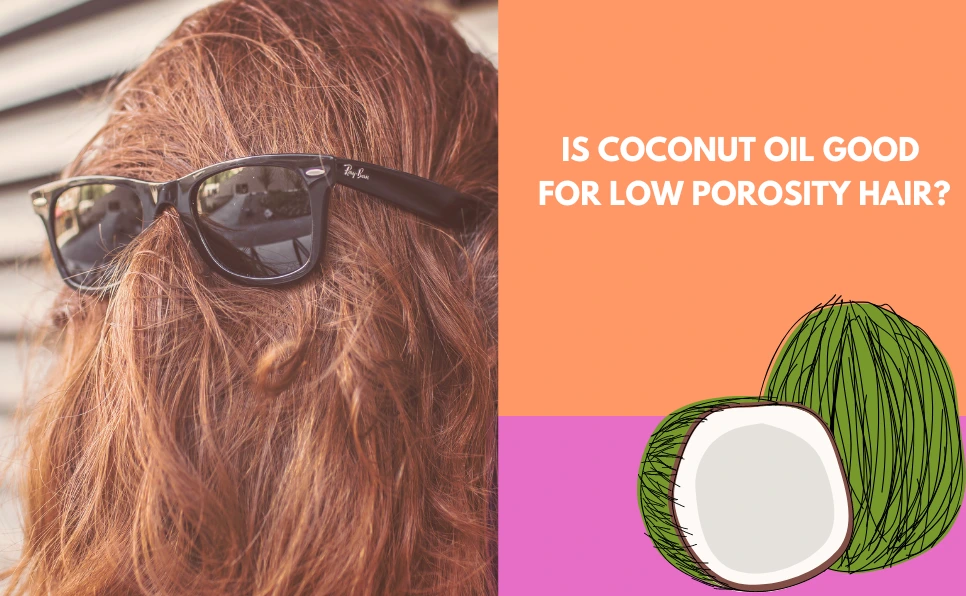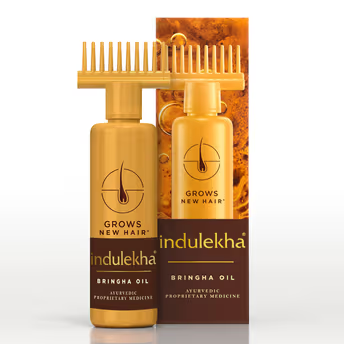
Why is Coconut Oil So Popular in Hair Care?
Coconut oil is a natural moisturizer for hair, and it will reduce the scalp dryness. Coconut oil also adds shine, moisturizes the scalp, and protects against damage. More over, coconut oil is rich in fatty acids that nourish and strengthen hair. Our grandparents used coconut oil properly daily because they knew about the benefits of coconut oil. Our head always should be cool and your feet should be warm, so coconut oil makes your head cool.
We suggest using a small amount of coconut oil with a mix other light hair oils.
Importance of choosing the right product for low porosity hair
Selecting the right products for low porosity hair is crucial, as moisture absorption for this hair type is very low. Applying heavy creams or oils tends to make the hair feel greasy and heavy as there is no absorption. In order to prevent this, please use light oils specially designed for low porosity hair and water-based products that offer hydration without clogging the hair cuticles.
The right products will assist in keeping the right moisture level in the hair, hence making it manageable, soft, and healthy with little or no product buildup. If you take good care, moisture content in your hair will be retained; hence, they will appear healthy and thicker. When it comes to curly hair, use low porosity curly hair gel.
What is low porosity hair?
Hair with low porosity is characterized by tightly packed cuticles that hinder the entrance of moisture or any product penetrating the hair. Most of the time, this type of hair resists water, which tends to remain on the outer surface rather than being absorbed.
As a result, this makes it difficult to moisturize such hair since heavy products tend to leave residue. Use thin oils for low porosity hair and water-based products that do not hydrate excess since these are ideal for low porosity hair hydration. Despite the fact that it can be a little challenging to moisturize low porosity hair at first, once the moisture gets in, the low porosity hair retains it, therefore keeping the hair healthy and strong with appropriate management.
Nutritional Properties of Coconut Oil
- Has lauric acid, which goes deep into the hair and makes it stronger and protects it from damage.
- Rich in vitamin E, which helps hair grow and keeps the scalp healthy.
Provides natural fatty acids that stop hair from losing protein, keeping it strong and healthy. - Works as a natural moisturizer, stopping dryness and breakage, especially for weak hair.
- Its antioxidants protect hair from pollution and damage, helping to make it stronger.
How Coconut Oil Affects Low Porosity Hair?
In the case of low porosity hair, coconut oil is beneficial in locking moisture and nourishing the hair. Nevertheless, as low porosity hair has cuticles that are tightly closed, coconut oil is likely to remain on the outermost surface, only making the hair greasy and heavy when used excessively. It may also cause product buildup.
For best results, use a tiny quantity on damp hair or add water to it before applying to prevent the hair from being heavy. Use chamomile decoration sparingly for nice and smooth hair.
Alternatives to Coconut Oil for Low Porosity Hair
In search of substitutes for coconut oil meant for low porosity hair, it is important to select lightweight oils that can be absorbed easily without causing the hair to be too heavy. Argan oil, jojoba oil, and grapeseed oil are some excellent examples. These oils also do not weigh low porosity hair down as much as deep copious oils do, as they are able to better penetrate the hair shaft.
Use oils that have small molecular sizes and that have moisture content. Aloe vera gel or gel-based leave-ins can also be used to provide moisturizers. Again, you want to keep this to a minimum and intend to apply oils after washing the hair when the hair is still damp for the best outcomes.
Choose the best oils for low porosity hair growth
To select the most suitable oils for low porosity hair, opt for light oils. Even better: lightweight oils that can penetrate the hair strands easily, and how about that? Argan oil, jojoba oil, and grapeseed oil are good examples of such lightweight oils for low porosity hair, as they don’t weigh the hair down too much.
These types of oils will condition your hair without greasing it. Go for oils that have nutritional value and also encourage hair growth. Heavy oils like coconut oil are not recommended as they tend to sit on the surface and lead to buildup. Applying the correct oils for low-porosity hair aids in moisture retention and encourages healthy hair growth.

Rosemary Hair Growth Oil with Rosemary

Indulekha Bringha Ayurvedic Hair Oil
Tips for Using Coconut Oil on Low Porosity Hair (If You Still Want to Try)
- Use in Small Amounts: Take a small amount of coconut oil to avoid greasiness and buildup on your hair.
- Apply on Damp Hair: After washing your hair, apply coconut oil to slightly damp hair. This helps lock in moisture better.
- Mix with lighter oils: Combine coconut oil with light oils like argan or jojoba oil for better absorption and to avoid weighing your hair down.
Conclusion
Nevertheless, its weightiness makes it inappropriate for low porosity hair, as it may help in moisture. It may just remain there and create buildup. Instead, using oils that are lighter in weight, such as argan, jojoba, or grapeseed oils, that have a better absorption rate and will not burden the hair, will be preferable. Resulting in thick, healthy, and properly nourished cuticles.
Related Posts

Top Tips to Protect Your Hair on Vacation: Keep It Healthy and Beautiful
Why It's Important to Protect Your Hair While Traveling When…
